Unit 1 Where did you go on vacation 单元语法讲练课件(共59张PPT,含内嵌视频)人教版八年级英语上册
文档属性
| 名称 | Unit 1 Where did you go on vacation 单元语法讲练课件(共59张PPT,含内嵌视频)人教版八年级英语上册 |  | |
| 格式 | pptx | ||
| 文件大小 | 26.9MB | ||
| 资源类型 | 教案 | ||
| 版本资源 | 人教新目标(Go for it)版 | ||
| 科目 | 英语 | ||
| 更新时间 | 2024-09-05 21:29:36 | ||
图片预览


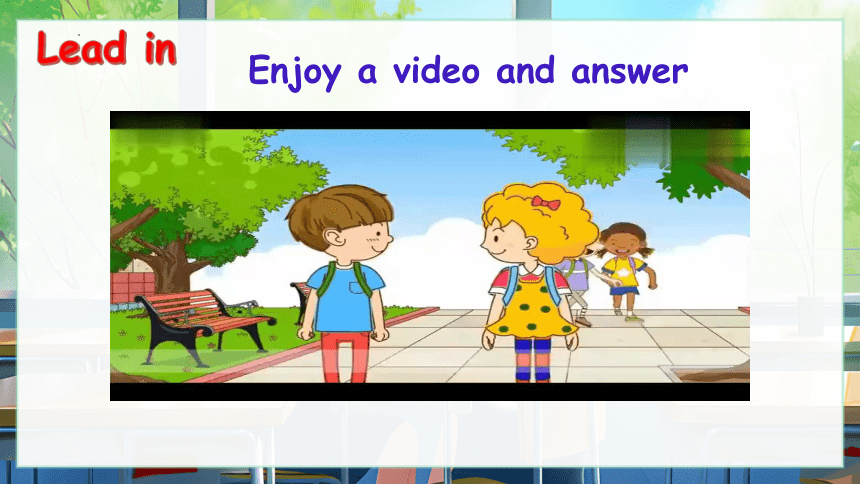
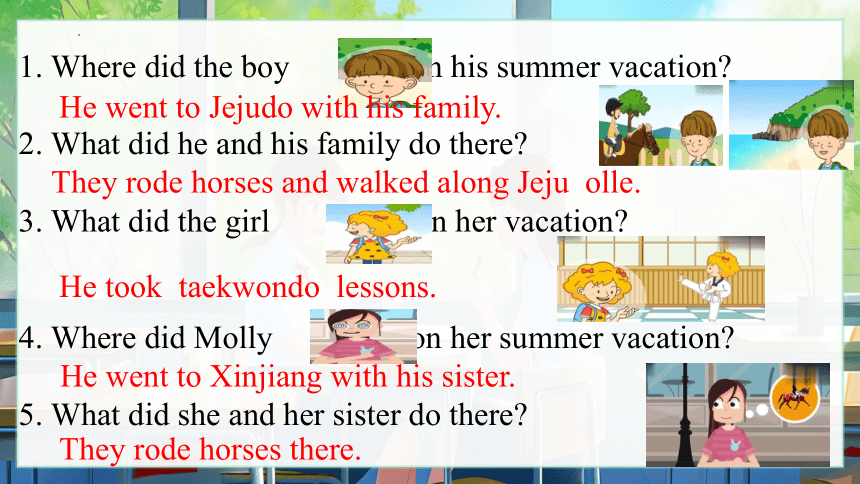
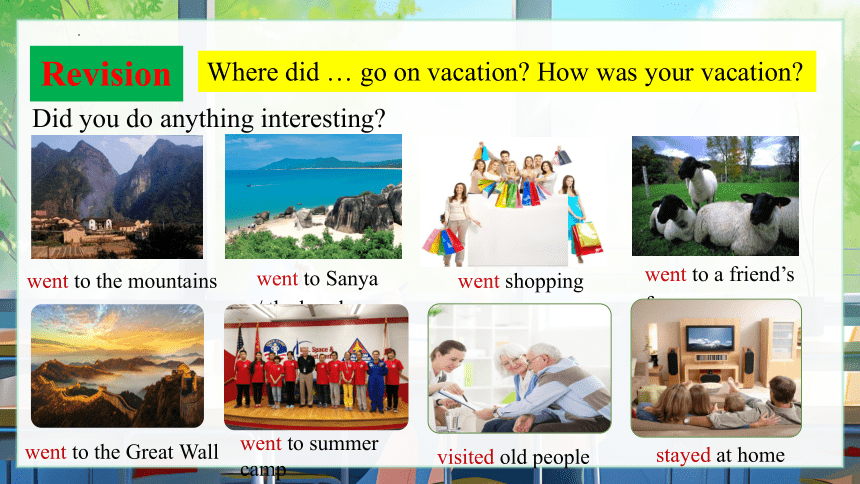
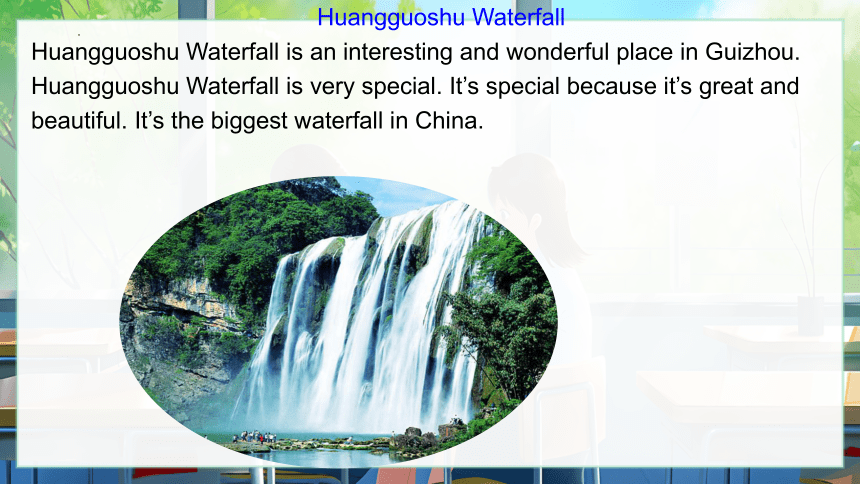

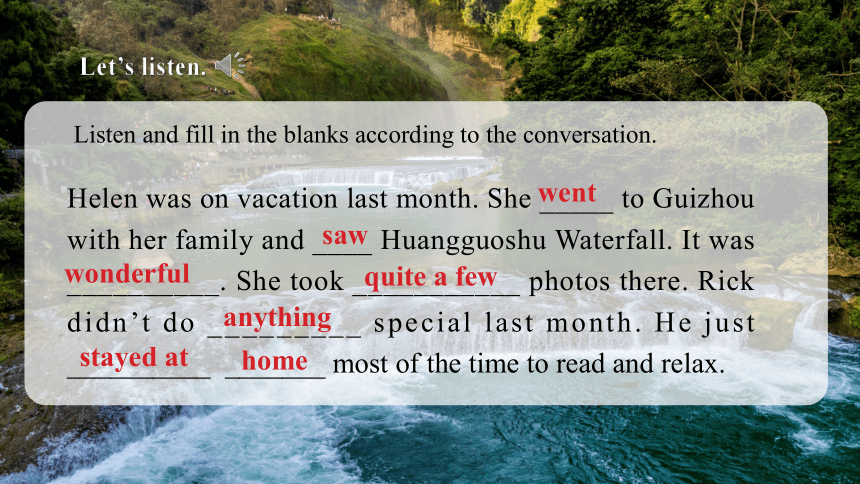

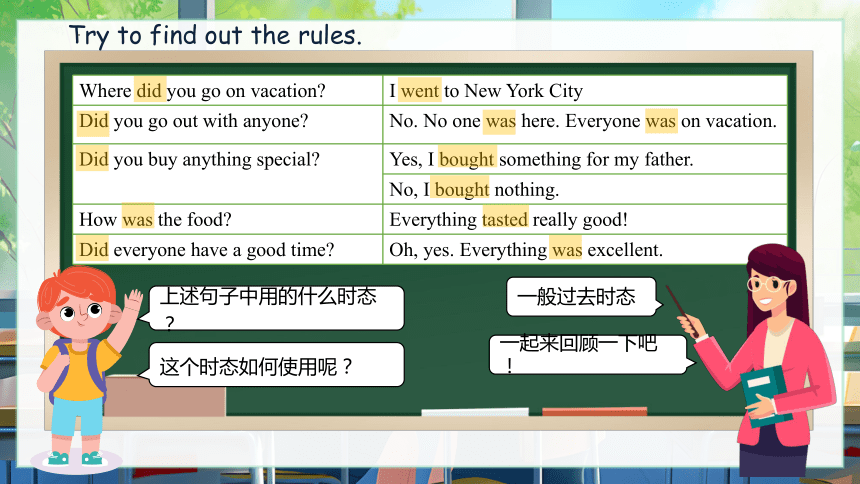

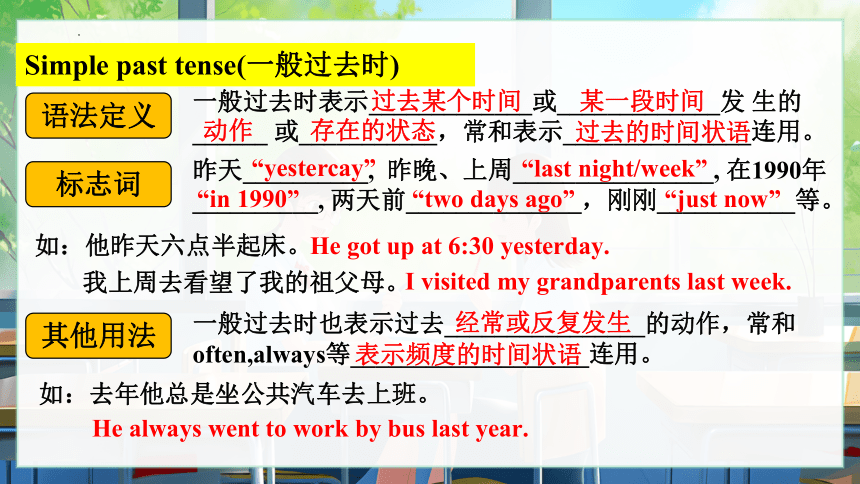
文档简介
(共59张PPT)
Unit1
Where did you go
on vacation
Section A 2d-Grammar focus
语言能力
在讨论假期生活的情境中,以听、说、读、看、写等方式理解并运用一般过去时以及复合不定代词表达意义。
学习能力
学生能够学习并运用听力、阅读和写作学习策略并愿意多渠道获得有关假期或旅行的英语资源。
文化意识
在全球旅行的情境下,学生能够对不同的国家地区的景观和文化做出正确的价值判断。
思维品质
学生通过全球旅行情境,可以从跨文化视角去观察和认识世界,分析和解决一些旅行中遇到的问题,培养逻辑性和创新性。
学习目标
Learning Objectives
动
Lead in
Enjoy a video and answer
动
1. Where did the boy go on his summer vacation
2. What did he and his family do there
3. What did the girl do on her vacation
4. Where did Molly go on her summer vacation
5. What did she and her sister do there
He went to Jejudo with his family.
They rode horses and walked along Jeju olle.
He took taekwondo lessons.
He went to Xinjiang with his sister.
They rode horses there.
Revision
Where did … go on vacation How was your vacation
went to Sanya
/ the beach
went shopping
went to a friend’s farm
went to the Great Wall
went to summer
camp
visited old people
stayed at home
went to the mountains
Did you do anything interesting
Huangguoshu Waterfall
Huangguoshu Waterfall is an interesting and wonderful place in Guizhou. Huangguoshu Waterfall is very special. It’s special because it’s great and beautiful. It’s the biggest waterfall in China.
Read the conversation quickly and answer the questions below.
1. Where did Helen go last month
2. Did she go out with anyone
3. Did she see anything beautiful
4. What did she think of it
She went to Guizhou.
Yes ,she went with her family.
She thought it was wonderful.
Yes,she saw Huangguoshu Waterfall.
2d
Watch and match
Let’s listen.
Listen and fill in the blanks according to the conversation.
Helen was on vacation last month. She _____ to Guizhou with her family and ____ Huangguoshu Waterfall. It was __________. She took ___________ photos there. Rick didn’t do _________ special last month. He just __________ _______ most of the time to read and relax.
went
saw
wonderful
quite a few
anything
stayed at
home
1. 你去了什么地方去度假?_____ ______ you go on _________
2. 我去了纽约市。I _______ ____ New York City.
3. 你和别的什么人一起去的吗?______ ______ go out with ________
4. 不,没有别人在这儿。每个人都在度假。
No. ____ _____ was here. ________ was on ________.
5. 你买了什么特别的东西了吗?____ you buy ________ _______
6. 是的,我为我爸爸买了些东西。Yes, I _____ _____ for my father.
7. 不,我没有买什么东西。No, I _______ _________.
8. 吃的怎么样?____ ____ the food
9. 所有的东西尝起来都很好。 __________ _______ really good.
10. 每个人都玩得很开心吗 _____ ________ have a good time
11. 是的。一切事物都很棒。Yes. __________was excellent.
vacation
Where did
went to
Did you
anyone
Have a test
Complete the sentences
No one
Everyone
vacation
Did
anything special
bought something
bought nothing
How was
Everything tasted
Did everyone
Everything
Where did you go on vacation I went to New York City
Did you go out with anyone No. No one was here. Everyone was on vacation.
Did you buy anything special Yes, I bought something for my father.
No, I bought nothing.
How was the food Everything tasted really good!
Did everyone have a good time Oh, yes. Everything was excellent.
Try to find out the rules.
上述句子中用的什么时态?
一般过去时态
这个时态如何使用呢?
一起来回顾一下吧!
1. Simple Past Tense
句式结构
表示含义
时间状语
主系表:主语+was/were+其他
主谓宾:主语+动词过去式+其他
过去某个时间发生的动作或存在的状态;
也表示过去经常或反复发生的动作。
yesterday
last month
last year
just now
… ago
in 2021
一般过去时
Simple past tense(一般过去时)
语法定义
一般过去时表示_____________或_____________发 生的______ 或___________,常和表示_______________连用。
过去某个时间
某一段时间
存在的状态
动作
过去的时间状语
标志词
昨天__________, 昨晚、上周________________, 在1990年__________, 两天前______________,刚刚___________等。
“yestercay”
“last night/week”
“in 1990”
“two days ago”
“just now”
如:他昨天六点半起床。
He got up at 6:30 yesterday.
I visited my grandparents last week.
我上周去看望了我的祖父母。
其他用法
一般过去时也表示过去________________的动作,常和often,always等___________________连用。
经常或反复发生
表示频度的时间状语
如:去年他总是坐公共汽车去上班。
He always went to work by bus last year.
动
发现一
一
般
过
去
时
用法
1. 表示过去某个时间发生的动作或存在的状态。
2. 表示过去经常或反复发生的动作。
谓语构成
常用时间
(the day before) yesterday last night / week in 1990
/ just now On Sunday morning two days ago
系动词be的过去时. am (is) →was are →were
肯定句:主语+was (were) +表语 He was at home yesterday.
否定句:主语+was (were) +not+表语 We weren't late yesterday. .
疑问句:Was (Were) +主语+表语? Were you ill yesterday
特殊疑问句:特殊疑问词+was (were) +主语 +其他?
行为动词的一般过去时:
肯定句:主语+动词过去式+其他。I went to the movie.
否定句:主语+助动词didn’t+动词原形+其他?→I didn’t go to school.
一般疑问句:Did +主语+动词原形+其他?
Did you have breakfast Yes, I do./ No, I don’t. Yes, I did./No, I didn’t.
特殊疑问句:疑问词+did+主语+动词原形+其他?
When did you visit the Great Wall
Simple Past Tense--Sentence Structure
一般过去有规则, 肯定句用过去式;
否定要把didn’t添,谓语动词须还原;
疑问did加在前, 动词也需要还原。
be动词 行为动词
肯定句 I was in Beijing last month. I went to Shanghai last Friday.
否定句 I wasn’t in Beijing last month. I didn’t go to Shanghai last Friday.
一般疑问句 —Were you in Beijing last month? —Yes, I was. / No, I wasn’t. —Did you go to Shanghai last Friday
—Yes, I did. / No, I didn’t.
含be动词的一般过去时的句式
肯定句:
否定句:
一般疑问句:
及其回答
特殊疑问句:
主语 + was/were + 其他.
主语 + was not( wasn’t)/were not( weren’t) + 其他.
Was/Were + 主语 + 其他
Yes, 主语 + was/were.
No, 主语 + wasn’t/weren’t.
特殊疑问词+was/were + 其他
There ______ a school concert last Friday. As you can see, there ______ many people and all of them ______ very happy. Unluckily, Amy ______ (be not)at the concert, because she ______ sick. Where ______ she She ______ in hospital. ______ there many pianos No, there _______.
was
were
were
wasn’t
was
was
was
Were
weren't
A:How your vacation, Lin
B: It pretty good.
A: How the beaches
B: They great.
A: How the weather
B: It hot and wet.
A: How the people
B: They unfriendly.
A:How the stores
B: They expensive.
was
was
were
were
was
was
were
were
were
were
Be— am/is(was)
are(were)
Be 填空
含do的一般过去时的句式
肯定句:
否定句:
一般疑问句:
及其回答
特殊疑问句:
主语 + 动词过去式 + 其他.
主语 + did not(didn’t) + 动词原形 + 其他.
Did +主语 + 动词原形 + 其他
Yes, 主语 + did.
No, 主语 + didn’t.
特殊疑问词 + did + 主语 + 动词原形 +其他.
Mike’s school trip ______ great. Where ______ she go She _______ (not go) to the zoo. She ______ (go) to a farm. On the farm, Carol ______ (milk) a cow and ______ (ride) a horse. ______ she feed chickens No, she ______. She only ______ (see) them.
In the afternoon, she ______ (take) some pictures of flowers. Then, she ______ (go) for a walk with her friends and ______ (talk) with a farmer.
was
did
didn’t go
went
milked
rode
didn’t
saw
took
went
talked
Did
II. 用所给动词的适当形式填空。
We ______ (live) in Japan last year.
Jack________ (stop) the car last Sunday.
Tom _______ (clean) his room and ________ (study) for the Chinese test last weekend.
4.What ______ you ______(do) last night
5.On Sunday morning I _____ (play) tennis.
lived
stopped
cleaned
studied
did
do
played
动词一般过去时,表示过去发生的事;
be用was或用were, have, has变had;
谓语动词过去式,过去时间作标志;
一般动词加-ed,若是特殊得硬记。
否定句很简单,主语之后didn’t添;
疑问句也不难,did放在主语前;
如果谓语之前有did,谓语动词需还原;
动词若是was, were,否定就把not添。
易记歌谣
规则变化 类别 构成方法 例词与发音 读音规则
直 一般情况 加-ed play-played/ple d/ offer-offered/ f d/ 清辅音后读/t/,浊辅音和元音后读/d/,/t/和/d/后面读/id/
去 以e结尾的动词 去e 加-ed like-liked/la kt/ hate-hated/ he t d/ 双 以重读闭音节结尾,且末尾只有一个辅音字母的动词 双写最后一个辅音字母,再加-ed plan-planned/pl nd/ stop-stopped/st pt/ 变 以“辅音字母+ y”结尾的动词 变y为i,再加-ed cry-cried/kra d/ study-studied/ st did/
Simple Past Tense--Past Forms
Simple Past Tense--Past Forms
类别 例词
不规则 原形 cut cut put put hurt hurt read read shut shut
不规则 do did speak spoke come came run ran drive drove see saw
go went get got take took eat ate find found fly flew
have had give gave lose lost make made meet met swim swam
am, is—was are—were go—went do—did
have—had come—came take—took say—said
eat—ate see—saw get—got put—put
sleep—slept give—gave write—wrot read—read
buy—bought sit—sat run—ran
swim —swam make—made feel—fel hear—heard
grow—grew tell—told know—knew find—found
begin—began bring —brought stand—stood spend—spent
catch—caught teach—taught
动词不规则变化
/red/
1.get — 2.say —
3.have — 4.be—
5.tell — 6.think —
7.write — 8.drive —
9.run — 10.read —
I. 写出下列单词的过去式。
got
said
had
was, were
told
thought
wrote
drove
ran
read
Exercises
巩固练习
11. see— 12. stand —
13. put — 14. eat —
15. buy — 16. drink —
17. sleep — e —
19. play — 20. study —
21. listen —
saw
stood
put
ate
bought
drank
slept
came
played
studied
listened
【语境应用】完成句子 。
1) 刚才Sandy尝了尝汤。
Sandy _______ _______ _______ just now.
2) 我昨晚在聚会上待到很晚。
I _______ _______ at the party last night.
3) 他们昨天下午四点到达北京的。
They _______ _______ Beijing at 4:00 yesterday afternoon.
tasted the soup
stayed late
arrived in /
got to
4) Cathy在母亲节给她妈妈买了一件礼物。
Cathy _______ _______ _______ for her mother on Mother's Day.
5) 今天早上我起晚了,因此什么都没有吃。
I got up late this morning, so I _______ _______.
6) Bob在公共汽车上感觉很糟,因为太挤了。
Bob _______ _______ on the bus because it was too crowded.
bought a gift
ate
felt terrible
nothing
III. 句型转换。
Lucy did her homework at home. (改否定句)
2. He found some meat in the fridge(冰箱).
(变一般疑问句)
3. She stayed there for a week.(画线部分提问)
Lucy didn’t do her homework at home.
Did he find any meat in the fridge
How long did she stay there
4. She went to the beach last Sunday.
(变一般疑问句)
5.They stayed at home on vacation.(就画线部分提问)
Did she go to the beach last Sunday
Where did they stay on vacation
6. The weather was hot and humid. (变否定句)
7. Nancy went to the cinema last night. (改为同义句)
8. The people in New York were friendly.
(就画线部分提问)
The weather wasn’t hot or humid.
Nancy went to see a film last night.
How were the people in New York
四、汉译英。
1. 最近每个人都很忙。
2.— 你假期做什么有趣的事了吗?
— 是的。 我去北京了。
Everyone is very busy these days.
—Did you do anything fun on your vacation
—Yes, I did. I went to Beijing.
3. 你假期过得怎么样?
How was your vacation
4. 晚上没有什么事可做,只好看书。
There was nothing much to do in the evening
but reading.
5. 我给我父母买了一些礼物,却没给自己买。
I bought some gifts for my parents, but nothing
for myself.
Last summer, I ______to the beach with my parents.
My vacation _____pretty good . I ____there by bus
_____my bus trip______ relaxing. The beach ______
very beautiful . It _______sunny. I _________ beach
volleyball and ______swimming. The people ______
friendly and the food was ________. I __________my
vacation very much and I _________to go there again.
went
was
went
and
was
was
was
were
delicious
enjoyed
hope
played
went
Write about your vacation and give a report.
Grammar Focus
Where did you go on vacation I went to New York City.
Did you go out with anyone No, No one was here. Everyone was on vacation.
Did you buy anything special Yes, I bought something for my father.
No, I bought nothing.
How was the food Everything tasted really good.
Did everyone have a good time Oh, yes, Everything was excellent
Read and find
动
发现二
复合不定代词
some, any, no, every与-one,-body,-thing可以
组成12个不定代词,他们分别是:
某人 某事
任何人 任何事
没有人 没有东西
每人 一切
someone
somebody
anyone\anybody
no one\ nobody
everyone
everybody
something
anything
nothing
everything
复合不定代词 用法 例句
something 常用于肯定句中 You can eat something first.
anything 常用于否定句及疑问句中 I didn’t eat anything for lunch.
Did you eat anything for lunch
用于肯定句中 You can take anything you like.
复合不定代词 用法 例句
everything 用于肯定句、否定句及疑问句中 Her son is everything to her.
Money isn’t everything.
How is everything
nothing 用于否定句,相当于not anything I have nothing to say now. = I don’t have anything to say now.
复合不定代词 用法 例句
someone 常用肯定句中 I saw someone in that room.
anyone 常用否定句及疑问句中 I didn’t see anyone in the room.
Did anyone call me yesterday
用肯定句中 Anyone can do that.
复合不定代词 用法 例句
everyone 用于肯定句、否定句及疑问句中 Everyone is here today.
Everyone doesn’t like the food here.
Did everyone in your class go for a trip
no one 常用于否定句中 No one wants to walk to the zoo.
some any
thing something anything
one someone anyone
由some和any构成的复合不定代词,如something,
anything等的用法和some和any的用法一样
考点①
肯定句
否定句
疑问句
1. 我想喝点东西。
I want _________to drink.
2.他什么也没说。
He didn't say __________.
3.你需要我从商店带点什么东西吗?
Do you need _________ from the shop
4.那个派对上的人我一个都不认识。
I don't know ___________at the party.
something
anything
anything
anyone
一般
情况
1.当some-复合不定代词可以用于疑问句,表示请求,建议,反问等,问话者希望得到肯定答复;
2.any用于肯定句,表任何,一切。
考点②
二般情况
1. 你想来点喝的吗?
Would you like _________ to drink
2. 来点喝的怎么样?
How about _________ to drink
3. 麻烦有没有人帮忙拿一下包呢?
Could _________ help me with my bag please
4. 他的父母能为他做任何事。
His parents can do _______ for him.
5. 你可以成为任何人,只要你努力。
You could be _________ if you work hard.
something
something
someone
anything
anyone
复合不定代词作主语,谓语动词用单数
考点③
1.Something ____ wrong with my watch.(be)
2.Well, everyone _______ to win. (want)
3. Nobody __________ what the weather will be like.(know)
4.There_________ something wrong with my bike.(be)
is
is
wants
knows
I meet someone interesting.
Did you meet anyone interesting
I want something special.
Did you eat anything delicious
形容词修饰复合不定代词,要置于其后。
考点④
动
3a
Fill in the blanks with the words in the box and practice the conversation.
Linda: Did you do _________ fun on your
vacation, Alice
Alice: Yes, I did. I went to Sanya.
Linda: How did you like it
Alice: Well, it was my first time there,
so _________ was really interesting.
Linda: Did you go with ________
Alice: Yes, I did. I went with my sister.
Linda: Did you go shopping
Alice: Of course! I bought________ for my
parents, but _________ for myself.
anyone
something
anything
everything
nothing
方法指导:
首先,应通读对话,掌握短文大意;
其次,回顾一下复合不定代词的用法。
然后,仔细阅读每个句子,根据空格前后的词语进行推敲。比如,第一句话是一个一般疑问句,空格前有do一词,可知空格处应anything
一词,意为“做什么事情”。其他类似。
anything
everything
anyone
something
nothing
动
自主探究
1. I bought something for my parents, but nothing for myself.
___________________________________________
Why didn't you buy anything for yourself
___________________________________________
myself意为_____, yourself 意为_____,像这样表示“某人自己
的词”叫_________。
myself yourself himself herself itself
我自己 你自己 他自己 她自己 它自己
ourselves yourselves themselves 我们自己 你们自己 他们自己 我给父母买了一些东西,但给自己什么也没买。
你为什么不给自己买东西呢?
我自己
你自己
反身代词
反身代词有:
动
1) Did you buy anything for yourself
你为你自己买什么东西了吗 (做介词宾语)
2) The old man taught himself English.
那位老人自学英语。(做动词宾语)
3) The thing itself is not important.
事情本身并不重要。(做同位语)
4) I myself visited my aunt last weekend.
上周我自己去拜访了姑姑。(做同位语)
反身代词用法:
动
2. How did you like it
________________________
句型:How do/did you like… 意思是“_________”,
相当于What do you think of ... ,和 How do
you feel about… 意为“某人过得……怎么样?”。如:
How do you like the TV show
= ____________________ the TV show
你觉得这个电视节目怎么样?
What do you think of
你觉得它怎么样?
你觉得…怎样?
anything
everyone/
anyone
Everything
nothing
no one
1.Where did Mark go on vacation
2.How was his vacation
3.What was the only problem
4.What did they do there
anything
everyone/anyone
Everything
nothing
no one
称呼,
正文
结束语
When you write an email:
“By for now”英语口语,接近“暂时,就此”的意思,常在书信,电邮的结尾出现
Ask your group questions about their last vacation. Then tell the class your results.
Did you… Everyone Someone No one
eating anything at a restaurant
read anything interesting
Visit anyone in your family
Buy anything
Keep a diary
1.keep a diary 记日记
2.at a restaurant在餐馆
3c
Report
In our group, everyone ate something at a restaurant. No one read anything interesting. Li Lei visited his grandparents in the town. Liu Xue bought something interesting. Xu Li kept a diary.
1.Yesterday Mom ________ me some money to buy a dictionary.
A. gives B. gave C. has given D. was giving
B
一般过去时
2. On January 29th, 2020, Zhong Nanshan and his team _____
over four hours online _____ five patients who were
seriously ill, and made a treatment plan for those patients.
A. spent; checking B. spent; to check
C. spend; checking D. spend; to check
A
3. Sally _______ where she had left the car and the police found it this morning.
A. forgot B. has forgotten C. forgets D. had forgotten
4. Eric often ______ his aunt before he moved to the city.
A. has visited B. visits C. visited
A
C
1.________ hopes for a sweet home as it provides us with warmth and trust.
A. None B. Everyone C. Nobody D. Somebody
(2020·江苏扬州中考)
2. —It’s unbelievable that 5G technology is progressing in such a rapid way!
—_______ is impossible.
A. Something B. Anything C. Nothing D.Everything
(2020湖北宜昌中考)
复合不定代词
B
C
3. — Have you asked _________ about the case
— No, except Bob.
A. everybody B. anybody C. nobody D. somebody
4. —Sally, I have _______ exciting to tell you. We will go back to school soon.
—Great!
A. anything B. something C. everything
A
B
go shopping 购物
keep a diary 记日记
in the countryside 在乡下
feed hens 喂母鸡
*anyone, someone, everyone, no one, anything, something, everything 及 nothing 的用法
*一般过去时的用法及动词过去式的变化
Ⅰ. 从方框中选择合适的词语填空,使每个句子在结构、句意和逻辑上正确。
1. There is _______ in the box. It is empty (空的).
2. ____________ is ready now for the party. Let's start.
3. —Is there __________ important in today's news
—No, there isn't.
4. —Would you like ___________ to eat, Emily
—Yes. Two cakes, please.
something, everything, anything, nothing
nothing
Everything
anything
something
someone, everyone, anyone, no one
5. —Did _______ call me when I was out, Alice
—Yes. Bob called you.
6. I'm very busy. I want _________ to help me with my work.
7. The game is very popular. __________ is interested in it.
8. —Who helped you clean the classroom yesterday
—_______. I did it all by myself.
anyone
someone
Everyone
No one
Ⅱ. 根据短文内容,用括号内所给词语的正确时态填空,使短文完整、通顺。
When I was young I lived in a village near the sea in Scotland (苏格兰). Life (1)_______(be) very different from now. It was the 1930s, so there was no TV, but my family had a radio, and we (2)__________(listen to) it every evening. My parents (3)__________(not have) a car, so I went to school by bicycle — 10 km every day!
was
listened to
didn't have
But I (4)___________(not study) very hard, and (5)_______(leave) school when I was fourteen. There were no cinemas near our village, so every Saturday I (6)_______(meet) my friends on the beach and we (7)_______(draw) pictures or letters in the sand all day. When I was fifteen, my parents (8)_______(sell) our house and the family (9)_______(move) to England. I never went back to my village, but I can still (10)_______(hear) the sea lapping (轻拍) on the beach.
didn't study
left
met
drew
sold
moved
hear
Homework:
Compulsory homework(必做作业)
1. 背诵并默写Section A Grammar Focus 中的句子。
2. 预习Section B1a-1d, 默写P4单词。
Optional homework (选做作业)
Write about your vacation
.
For example :Last summer I went to the beach . My vacation was great . I went there by bus and my bus trip was relaxing . The beach was very beautiful . It was sunny, cool and humid .the people were friendly and the food were delicious .I enjoyed my vacation very much and I hope to go there again .
Unit1
Where did you go
on vacation
Section A 2d-Grammar focus
语言能力
在讨论假期生活的情境中,以听、说、读、看、写等方式理解并运用一般过去时以及复合不定代词表达意义。
学习能力
学生能够学习并运用听力、阅读和写作学习策略并愿意多渠道获得有关假期或旅行的英语资源。
文化意识
在全球旅行的情境下,学生能够对不同的国家地区的景观和文化做出正确的价值判断。
思维品质
学生通过全球旅行情境,可以从跨文化视角去观察和认识世界,分析和解决一些旅行中遇到的问题,培养逻辑性和创新性。
学习目标
Learning Objectives
动
Lead in
Enjoy a video and answer
动
1. Where did the boy go on his summer vacation
2. What did he and his family do there
3. What did the girl do on her vacation
4. Where did Molly go on her summer vacation
5. What did she and her sister do there
He went to Jejudo with his family.
They rode horses and walked along Jeju olle.
He took taekwondo lessons.
He went to Xinjiang with his sister.
They rode horses there.
Revision
Where did … go on vacation How was your vacation
went to Sanya
/ the beach
went shopping
went to a friend’s farm
went to the Great Wall
went to summer
camp
visited old people
stayed at home
went to the mountains
Did you do anything interesting
Huangguoshu Waterfall
Huangguoshu Waterfall is an interesting and wonderful place in Guizhou. Huangguoshu Waterfall is very special. It’s special because it’s great and beautiful. It’s the biggest waterfall in China.
Read the conversation quickly and answer the questions below.
1. Where did Helen go last month
2. Did she go out with anyone
3. Did she see anything beautiful
4. What did she think of it
She went to Guizhou.
Yes ,she went with her family.
She thought it was wonderful.
Yes,she saw Huangguoshu Waterfall.
2d
Watch and match
Let’s listen.
Listen and fill in the blanks according to the conversation.
Helen was on vacation last month. She _____ to Guizhou with her family and ____ Huangguoshu Waterfall. It was __________. She took ___________ photos there. Rick didn’t do _________ special last month. He just __________ _______ most of the time to read and relax.
went
saw
wonderful
quite a few
anything
stayed at
home
1. 你去了什么地方去度假?_____ ______ you go on _________
2. 我去了纽约市。I _______ ____ New York City.
3. 你和别的什么人一起去的吗?______ ______ go out with ________
4. 不,没有别人在这儿。每个人都在度假。
No. ____ _____ was here. ________ was on ________.
5. 你买了什么特别的东西了吗?____ you buy ________ _______
6. 是的,我为我爸爸买了些东西。Yes, I _____ _____ for my father.
7. 不,我没有买什么东西。No, I _______ _________.
8. 吃的怎么样?____ ____ the food
9. 所有的东西尝起来都很好。 __________ _______ really good.
10. 每个人都玩得很开心吗 _____ ________ have a good time
11. 是的。一切事物都很棒。Yes. __________was excellent.
vacation
Where did
went to
Did you
anyone
Have a test
Complete the sentences
No one
Everyone
vacation
Did
anything special
bought something
bought nothing
How was
Everything tasted
Did everyone
Everything
Where did you go on vacation I went to New York City
Did you go out with anyone No. No one was here. Everyone was on vacation.
Did you buy anything special Yes, I bought something for my father.
No, I bought nothing.
How was the food Everything tasted really good!
Did everyone have a good time Oh, yes. Everything was excellent.
Try to find out the rules.
上述句子中用的什么时态?
一般过去时态
这个时态如何使用呢?
一起来回顾一下吧!
1. Simple Past Tense
句式结构
表示含义
时间状语
主系表:主语+was/were+其他
主谓宾:主语+动词过去式+其他
过去某个时间发生的动作或存在的状态;
也表示过去经常或反复发生的动作。
yesterday
last month
last year
just now
… ago
in 2021
一般过去时
Simple past tense(一般过去时)
语法定义
一般过去时表示_____________或_____________发 生的______ 或___________,常和表示_______________连用。
过去某个时间
某一段时间
存在的状态
动作
过去的时间状语
标志词
昨天__________, 昨晚、上周________________, 在1990年__________, 两天前______________,刚刚___________等。
“yestercay”
“last night/week”
“in 1990”
“two days ago”
“just now”
如:他昨天六点半起床。
He got up at 6:30 yesterday.
I visited my grandparents last week.
我上周去看望了我的祖父母。
其他用法
一般过去时也表示过去________________的动作,常和often,always等___________________连用。
经常或反复发生
表示频度的时间状语
如:去年他总是坐公共汽车去上班。
He always went to work by bus last year.
动
发现一
一
般
过
去
时
用法
1. 表示过去某个时间发生的动作或存在的状态。
2. 表示过去经常或反复发生的动作。
谓语构成
常用时间
(the day before) yesterday last night / week in 1990
/ just now On Sunday morning two days ago
系动词be的过去时. am (is) →was are →were
肯定句:主语+was (were) +表语 He was at home yesterday.
否定句:主语+was (were) +not+表语 We weren't late yesterday. .
疑问句:Was (Were) +主语+表语? Were you ill yesterday
特殊疑问句:特殊疑问词+was (were) +主语 +其他?
行为动词的一般过去时:
肯定句:主语+动词过去式+其他。I went to the movie.
否定句:主语+助动词didn’t+动词原形+其他?→I didn’t go to school.
一般疑问句:Did +主语+动词原形+其他?
Did you have breakfast Yes, I do./ No, I don’t. Yes, I did./No, I didn’t.
特殊疑问句:疑问词+did+主语+动词原形+其他?
When did you visit the Great Wall
Simple Past Tense--Sentence Structure
一般过去有规则, 肯定句用过去式;
否定要把didn’t添,谓语动词须还原;
疑问did加在前, 动词也需要还原。
be动词 行为动词
肯定句 I was in Beijing last month. I went to Shanghai last Friday.
否定句 I wasn’t in Beijing last month. I didn’t go to Shanghai last Friday.
一般疑问句 —Were you in Beijing last month? —Yes, I was. / No, I wasn’t. —Did you go to Shanghai last Friday
—Yes, I did. / No, I didn’t.
含be动词的一般过去时的句式
肯定句:
否定句:
一般疑问句:
及其回答
特殊疑问句:
主语 + was/were + 其他.
主语 + was not( wasn’t)/were not( weren’t) + 其他.
Was/Were + 主语 + 其他
Yes, 主语 + was/were.
No, 主语 + wasn’t/weren’t.
特殊疑问词+was/were + 其他
There ______ a school concert last Friday. As you can see, there ______ many people and all of them ______ very happy. Unluckily, Amy ______ (be not)at the concert, because she ______ sick. Where ______ she She ______ in hospital. ______ there many pianos No, there _______.
was
were
were
wasn’t
was
was
was
Were
weren't
A:How your vacation, Lin
B: It pretty good.
A: How the beaches
B: They great.
A: How the weather
B: It hot and wet.
A: How the people
B: They unfriendly.
A:How the stores
B: They expensive.
was
was
were
were
was
was
were
were
were
were
Be— am/is(was)
are(were)
Be 填空
含do的一般过去时的句式
肯定句:
否定句:
一般疑问句:
及其回答
特殊疑问句:
主语 + 动词过去式 + 其他.
主语 + did not(didn’t) + 动词原形 + 其他.
Did +主语 + 动词原形 + 其他
Yes, 主语 + did.
No, 主语 + didn’t.
特殊疑问词 + did + 主语 + 动词原形 +其他.
Mike’s school trip ______ great. Where ______ she go She _______ (not go) to the zoo. She ______ (go) to a farm. On the farm, Carol ______ (milk) a cow and ______ (ride) a horse. ______ she feed chickens No, she ______. She only ______ (see) them.
In the afternoon, she ______ (take) some pictures of flowers. Then, she ______ (go) for a walk with her friends and ______ (talk) with a farmer.
was
did
didn’t go
went
milked
rode
didn’t
saw
took
went
talked
Did
II. 用所给动词的适当形式填空。
We ______ (live) in Japan last year.
Jack________ (stop) the car last Sunday.
Tom _______ (clean) his room and ________ (study) for the Chinese test last weekend.
4.What ______ you ______(do) last night
5.On Sunday morning I _____ (play) tennis.
lived
stopped
cleaned
studied
did
do
played
动词一般过去时,表示过去发生的事;
be用was或用were, have, has变had;
谓语动词过去式,过去时间作标志;
一般动词加-ed,若是特殊得硬记。
否定句很简单,主语之后didn’t添;
疑问句也不难,did放在主语前;
如果谓语之前有did,谓语动词需还原;
动词若是was, were,否定就把not添。
易记歌谣
规则变化 类别 构成方法 例词与发音 读音规则
直 一般情况 加-ed play-played/ple d/ offer-offered/ f d/ 清辅音后读/t/,浊辅音和元音后读/d/,/t/和/d/后面读/id/
去 以e结尾的动词 去e 加-ed like-liked/la kt/ hate-hated/ he t d/ 双 以重读闭音节结尾,且末尾只有一个辅音字母的动词 双写最后一个辅音字母,再加-ed plan-planned/pl nd/ stop-stopped/st pt/ 变 以“辅音字母+ y”结尾的动词 变y为i,再加-ed cry-cried/kra d/ study-studied/ st did/
Simple Past Tense--Past Forms
Simple Past Tense--Past Forms
类别 例词
不规则 原形 cut cut put put hurt hurt read read shut shut
不规则 do did speak spoke come came run ran drive drove see saw
go went get got take took eat ate find found fly flew
have had give gave lose lost make made meet met swim swam
am, is—was are—were go—went do—did
have—had come—came take—took say—said
eat—ate see—saw get—got put—put
sleep—slept give—gave write—wrot read—read
buy—bought sit—sat run—ran
swim —swam make—made feel—fel hear—heard
grow—grew tell—told know—knew find—found
begin—began bring —brought stand—stood spend—spent
catch—caught teach—taught
动词不规则变化
/red/
1.get — 2.say —
3.have — 4.be—
5.tell — 6.think —
7.write — 8.drive —
9.run — 10.read —
I. 写出下列单词的过去式。
got
said
had
was, were
told
thought
wrote
drove
ran
read
Exercises
巩固练习
11. see— 12. stand —
13. put — 14. eat —
15. buy — 16. drink —
17. sleep — e —
19. play — 20. study —
21. listen —
saw
stood
put
ate
bought
drank
slept
came
played
studied
listened
【语境应用】完成句子 。
1) 刚才Sandy尝了尝汤。
Sandy _______ _______ _______ just now.
2) 我昨晚在聚会上待到很晚。
I _______ _______ at the party last night.
3) 他们昨天下午四点到达北京的。
They _______ _______ Beijing at 4:00 yesterday afternoon.
tasted the soup
stayed late
arrived in /
got to
4) Cathy在母亲节给她妈妈买了一件礼物。
Cathy _______ _______ _______ for her mother on Mother's Day.
5) 今天早上我起晚了,因此什么都没有吃。
I got up late this morning, so I _______ _______.
6) Bob在公共汽车上感觉很糟,因为太挤了。
Bob _______ _______ on the bus because it was too crowded.
bought a gift
ate
felt terrible
nothing
III. 句型转换。
Lucy did her homework at home. (改否定句)
2. He found some meat in the fridge(冰箱).
(变一般疑问句)
3. She stayed there for a week.(画线部分提问)
Lucy didn’t do her homework at home.
Did he find any meat in the fridge
How long did she stay there
4. She went to the beach last Sunday.
(变一般疑问句)
5.They stayed at home on vacation.(就画线部分提问)
Did she go to the beach last Sunday
Where did they stay on vacation
6. The weather was hot and humid. (变否定句)
7. Nancy went to the cinema last night. (改为同义句)
8. The people in New York were friendly.
(就画线部分提问)
The weather wasn’t hot or humid.
Nancy went to see a film last night.
How were the people in New York
四、汉译英。
1. 最近每个人都很忙。
2.— 你假期做什么有趣的事了吗?
— 是的。 我去北京了。
Everyone is very busy these days.
—Did you do anything fun on your vacation
—Yes, I did. I went to Beijing.
3. 你假期过得怎么样?
How was your vacation
4. 晚上没有什么事可做,只好看书。
There was nothing much to do in the evening
but reading.
5. 我给我父母买了一些礼物,却没给自己买。
I bought some gifts for my parents, but nothing
for myself.
Last summer, I ______to the beach with my parents.
My vacation _____pretty good . I ____there by bus
_____my bus trip______ relaxing. The beach ______
very beautiful . It _______sunny. I _________ beach
volleyball and ______swimming. The people ______
friendly and the food was ________. I __________my
vacation very much and I _________to go there again.
went
was
went
and
was
was
was
were
delicious
enjoyed
hope
played
went
Write about your vacation and give a report.
Grammar Focus
Where did you go on vacation I went to New York City.
Did you go out with anyone No, No one was here. Everyone was on vacation.
Did you buy anything special Yes, I bought something for my father.
No, I bought nothing.
How was the food Everything tasted really good.
Did everyone have a good time Oh, yes, Everything was excellent
Read and find
动
发现二
复合不定代词
some, any, no, every与-one,-body,-thing可以
组成12个不定代词,他们分别是:
某人 某事
任何人 任何事
没有人 没有东西
每人 一切
someone
somebody
anyone\anybody
no one\ nobody
everyone
everybody
something
anything
nothing
everything
复合不定代词 用法 例句
something 常用于肯定句中 You can eat something first.
anything 常用于否定句及疑问句中 I didn’t eat anything for lunch.
Did you eat anything for lunch
用于肯定句中 You can take anything you like.
复合不定代词 用法 例句
everything 用于肯定句、否定句及疑问句中 Her son is everything to her.
Money isn’t everything.
How is everything
nothing 用于否定句,相当于not anything I have nothing to say now. = I don’t have anything to say now.
复合不定代词 用法 例句
someone 常用肯定句中 I saw someone in that room.
anyone 常用否定句及疑问句中 I didn’t see anyone in the room.
Did anyone call me yesterday
用肯定句中 Anyone can do that.
复合不定代词 用法 例句
everyone 用于肯定句、否定句及疑问句中 Everyone is here today.
Everyone doesn’t like the food here.
Did everyone in your class go for a trip
no one 常用于否定句中 No one wants to walk to the zoo.
some any
thing something anything
one someone anyone
由some和any构成的复合不定代词,如something,
anything等的用法和some和any的用法一样
考点①
肯定句
否定句
疑问句
1. 我想喝点东西。
I want _________to drink.
2.他什么也没说。
He didn't say __________.
3.你需要我从商店带点什么东西吗?
Do you need _________ from the shop
4.那个派对上的人我一个都不认识。
I don't know ___________at the party.
something
anything
anything
anyone
一般
情况
1.当some-复合不定代词可以用于疑问句,表示请求,建议,反问等,问话者希望得到肯定答复;
2.any用于肯定句,表任何,一切。
考点②
二般情况
1. 你想来点喝的吗?
Would you like _________ to drink
2. 来点喝的怎么样?
How about _________ to drink
3. 麻烦有没有人帮忙拿一下包呢?
Could _________ help me with my bag please
4. 他的父母能为他做任何事。
His parents can do _______ for him.
5. 你可以成为任何人,只要你努力。
You could be _________ if you work hard.
something
something
someone
anything
anyone
复合不定代词作主语,谓语动词用单数
考点③
1.Something ____ wrong with my watch.(be)
2.Well, everyone _______ to win. (want)
3. Nobody __________ what the weather will be like.(know)
4.There_________ something wrong with my bike.(be)
is
is
wants
knows
I meet someone interesting.
Did you meet anyone interesting
I want something special.
Did you eat anything delicious
形容词修饰复合不定代词,要置于其后。
考点④
动
3a
Fill in the blanks with the words in the box and practice the conversation.
Linda: Did you do _________ fun on your
vacation, Alice
Alice: Yes, I did. I went to Sanya.
Linda: How did you like it
Alice: Well, it was my first time there,
so _________ was really interesting.
Linda: Did you go with ________
Alice: Yes, I did. I went with my sister.
Linda: Did you go shopping
Alice: Of course! I bought________ for my
parents, but _________ for myself.
anyone
something
anything
everything
nothing
方法指导:
首先,应通读对话,掌握短文大意;
其次,回顾一下复合不定代词的用法。
然后,仔细阅读每个句子,根据空格前后的词语进行推敲。比如,第一句话是一个一般疑问句,空格前有do一词,可知空格处应anything
一词,意为“做什么事情”。其他类似。
anything
everything
anyone
something
nothing
动
自主探究
1. I bought something for my parents, but nothing for myself.
___________________________________________
Why didn't you buy anything for yourself
___________________________________________
myself意为_____, yourself 意为_____,像这样表示“某人自己
的词”叫_________。
myself yourself himself herself itself
我自己 你自己 他自己 她自己 它自己
ourselves yourselves themselves 我们自己 你们自己 他们自己 我给父母买了一些东西,但给自己什么也没买。
你为什么不给自己买东西呢?
我自己
你自己
反身代词
反身代词有:
动
1) Did you buy anything for yourself
你为你自己买什么东西了吗 (做介词宾语)
2) The old man taught himself English.
那位老人自学英语。(做动词宾语)
3) The thing itself is not important.
事情本身并不重要。(做同位语)
4) I myself visited my aunt last weekend.
上周我自己去拜访了姑姑。(做同位语)
反身代词用法:
动
2. How did you like it
________________________
句型:How do/did you like… 意思是“_________”,
相当于What do you think of ... ,和 How do
you feel about… 意为“某人过得……怎么样?”。如:
How do you like the TV show
= ____________________ the TV show
你觉得这个电视节目怎么样?
What do you think of
你觉得它怎么样?
你觉得…怎样?
anything
everyone/
anyone
Everything
nothing
no one
1.Where did Mark go on vacation
2.How was his vacation
3.What was the only problem
4.What did they do there
anything
everyone/anyone
Everything
nothing
no one
称呼,
正文
结束语
When you write an email:
“By for now”英语口语,接近“暂时,就此”的意思,常在书信,电邮的结尾出现
Ask your group questions about their last vacation. Then tell the class your results.
Did you… Everyone Someone No one
eating anything at a restaurant
read anything interesting
Visit anyone in your family
Buy anything
Keep a diary
1.keep a diary 记日记
2.at a restaurant在餐馆
3c
Report
In our group, everyone ate something at a restaurant. No one read anything interesting. Li Lei visited his grandparents in the town. Liu Xue bought something interesting. Xu Li kept a diary.
1.Yesterday Mom ________ me some money to buy a dictionary.
A. gives B. gave C. has given D. was giving
B
一般过去时
2. On January 29th, 2020, Zhong Nanshan and his team _____
over four hours online _____ five patients who were
seriously ill, and made a treatment plan for those patients.
A. spent; checking B. spent; to check
C. spend; checking D. spend; to check
A
3. Sally _______ where she had left the car and the police found it this morning.
A. forgot B. has forgotten C. forgets D. had forgotten
4. Eric often ______ his aunt before he moved to the city.
A. has visited B. visits C. visited
A
C
1.________ hopes for a sweet home as it provides us with warmth and trust.
A. None B. Everyone C. Nobody D. Somebody
(2020·江苏扬州中考)
2. —It’s unbelievable that 5G technology is progressing in such a rapid way!
—_______ is impossible.
A. Something B. Anything C. Nothing D.Everything
(2020湖北宜昌中考)
复合不定代词
B
C
3. — Have you asked _________ about the case
— No, except Bob.
A. everybody B. anybody C. nobody D. somebody
4. —Sally, I have _______ exciting to tell you. We will go back to school soon.
—Great!
A. anything B. something C. everything
A
B
go shopping 购物
keep a diary 记日记
in the countryside 在乡下
feed hens 喂母鸡
*anyone, someone, everyone, no one, anything, something, everything 及 nothing 的用法
*一般过去时的用法及动词过去式的变化
Ⅰ. 从方框中选择合适的词语填空,使每个句子在结构、句意和逻辑上正确。
1. There is _______ in the box. It is empty (空的).
2. ____________ is ready now for the party. Let's start.
3. —Is there __________ important in today's news
—No, there isn't.
4. —Would you like ___________ to eat, Emily
—Yes. Two cakes, please.
something, everything, anything, nothing
nothing
Everything
anything
something
someone, everyone, anyone, no one
5. —Did _______ call me when I was out, Alice
—Yes. Bob called you.
6. I'm very busy. I want _________ to help me with my work.
7. The game is very popular. __________ is interested in it.
8. —Who helped you clean the classroom yesterday
—_______. I did it all by myself.
anyone
someone
Everyone
No one
Ⅱ. 根据短文内容,用括号内所给词语的正确时态填空,使短文完整、通顺。
When I was young I lived in a village near the sea in Scotland (苏格兰). Life (1)_______(be) very different from now. It was the 1930s, so there was no TV, but my family had a radio, and we (2)__________(listen to) it every evening. My parents (3)__________(not have) a car, so I went to school by bicycle — 10 km every day!
was
listened to
didn't have
But I (4)___________(not study) very hard, and (5)_______(leave) school when I was fourteen. There were no cinemas near our village, so every Saturday I (6)_______(meet) my friends on the beach and we (7)_______(draw) pictures or letters in the sand all day. When I was fifteen, my parents (8)_______(sell) our house and the family (9)_______(move) to England. I never went back to my village, but I can still (10)_______(hear) the sea lapping (轻拍) on the beach.
didn't study
left
met
drew
sold
moved
hear
Homework:
Compulsory homework(必做作业)
1. 背诵并默写Section A Grammar Focus 中的句子。
2. 预习Section B1a-1d, 默写P4单词。
Optional homework (选做作业)
Write about your vacation
.
For example :Last summer I went to the beach . My vacation was great . I went there by bus and my bus trip was relaxing . The beach was very beautiful . It was sunny, cool and humid .the people were friendly and the food were delicious .I enjoyed my vacation very much and I hope to go there again .
同课章节目录
- Unit 1 Where did you go on vacation?
- Section A
- Section B
- Unit 2 How often do you exercise?
- Section A
- Section B
- Unit 3 I'm more outgoing than my sister.
- Section A
- Section B
- Unit 4 What's the best movie theater?
- Section A
- Section B
- Unit 5 Do you want to watch a game show?
- Section A
- Section B
- Unit 6 I'm going to study computer science.
- Section A
- Section B
- Unit 7 Will people have robots?
- Section A
- Section B
- Unit 8 How do you make a banana milk shake?
- Section A
- Section B
- Unit 9 Can you come to my party?
- Section A
- Section B
- Unit 10 If you go to the party, you'll have a grea
- Section A
- Section B
